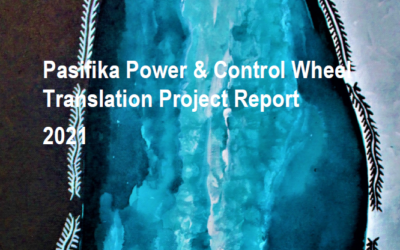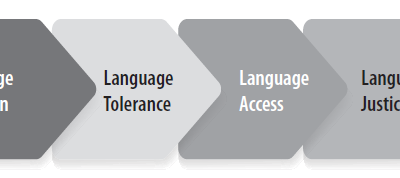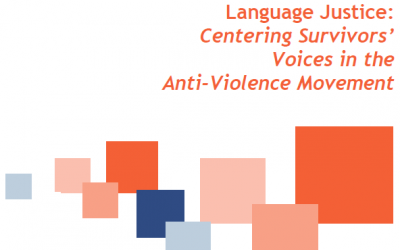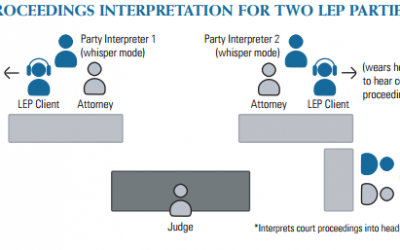Language Access, Interpretation, and Translation
In the U.S. in 2011, 21% of those over 5 spoke a language other than English at home. Of those, 41.8% (25,321,194) spoke English less than “very well.”
U.S. Census American Community Survey data on Language Use, 2011
Interpretation Technical Assistance & Resource Center (ITARC)
The Interpretation Technical Assistance & Resource Center (ITARC) works to improve systems responses to LEP victims by providing technical assistance and training on the development and implementation of language accessible services. Technical assistance and training includes, but is not limited to: civil rights compliance and language access planning; interpreting for victims of domestic violence and sexual assault ; and building pools of qualified interpreters through workshops on interpretation ethics and skills building.
Request Technical Assistance or Training on Language Access
Potential topics include:
- Federal and state laws and policies on language access in civil and criminal courts,
- Meeting the needs of culturally diverse victims/survivors with limited English proficiency,
- Improving language access policies and practices in organizations and systems,
- Roles and responsibilities of advocates and systems personnel at various points of contact,
- Model programs and practices for interpretation services,
- Training and qualifying standards for court interpretation, and
- Finding and working with interpreters.
Resources on Language Access
AAPI IN-Language Resources
A collection of resources related to domestic violence, sexual assault, safety planning, and other related topics in Asian and Pacific Islander languages, along with English versions, as available.
Zoom Interpreting and Closed Captioning Guide for Service Providers, 2022
Tips and resources on Zoom interpreting and closed captioning for service providers.
Pasifika Power & Control Wheel Translation Project, 2021
This project aimed to translate and develop educational resources and tools on GBV in indigenous Pasifika languages. The project aims to empower individuals, families, community-based and system responders, allied professionals, and the community-at-large with culturally responsive resources to address and prevent GBV in Pasifika communities. Resources include project report and glossaries and tools for Samoan, Chuukese, and Native Hawaiian communities.
Language Justice Principles for Everyday Practice and During COVID-19
What is language justice, what are tips for lawyers to practice it, and why is this especially important during the COVID-19 pandemic? This article answers these commonly asked questions and more.
Language Justice in Legal Services, 2019
Published by Management Information Exchange Journal
This article positions language justice as a critical
part of effective and inclusive legal services, and introduces a framework for assessing and strengthening practices for servicing individuals who do not communicate in English as their dominant language.
From Language Access to Language Justice: Centering Survivors’ Voices in the Anti-Violence Movement, 2019
A Language Justice approach allows agencies to engage diverse organizations, local communities, stakeholders, and victims/survivors in anti-violence initiatives, placing everyone on equal footing through interpretation, translation, and other strategies for equal communication
Resource Guide for Advocates & Attorneys on Interpretation Services for Domestic Violence Victims, 2016
Information, tips, tools, and resources for ensuring language access in service agencies.
Language Access Policy Template, 2016
Use this template to create a language access plan for your agency.
Developing a Language Access Plan for Your Agency, 2015
Guidelines on developing a language access plan that complies with federal standards.
Interpretation Services, 2015
Tips and resources on finding and screening interpreters.
Serving Individuals Who Are Deaf, Hard of Hearing or Deaf-Blind and Do Not Use American Sign Language, 2015
Tips and resources on ensuring access for victims who have additional language access needs.
Working with Interpreters, 2015
Suggestions for working with interpreters to serve victims with limited English proficiency
How to Address Problems with Interpretation, 2015
Problems that may arise when using an interpreter, and tips on what should be done.
Considerations When Using Interpreters for Victims with Limited English Proficiency, 2015
Tips on ensuring accurate interpretation and confidentiality while avoiding conflicts of interest.
Other Resources
LEP.gov: Information, tools, and technical assistance regarding language access for federal agencies, federal fund recipients, and stakeholders.
- Commonly asked questions
- Limited English proficient maps
- Tips and resources on interpretation and translation
- Video trainings on LEP and Title VI videos
Hot Peach Pages: Domestic violence resources in over 110 languages
American Bar Association language access resources
Please see our Language Access Resource Guide for additional resources



